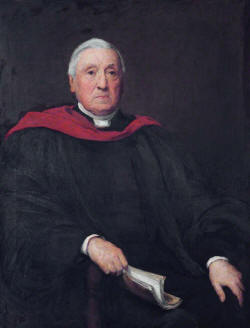Queer Places:
University of Cambridge, 4 Mill Ln, Cambridge CB2 1RZ
Harrow School, 5 High St, Harrow, Harrow on the Hill HA1 3HP
Mill Road Cemetery
Cambridge, City of Cambridge, Cambridgeshire, England
 Benjamin Hall Kennedy (6 November 1804 – 6 April 1889) was an English scholar and schoolmaster, known for his work in the teaching of the Latin language. He was an active supporter of Newnham College and Girton College as Cambridge University colleges for women.
He was a member of the Cambridge Apostles.
Benjamin Hall Kennedy (6 November 1804 – 6 April 1889) was an English scholar and schoolmaster, known for his work in the teaching of the Latin language. He was an active supporter of Newnham College and Girton College as Cambridge University colleges for women.
He was a member of the Cambridge Apostles.
He was born at Summer Hill, near Birmingham, the eldest son of Rann Kennedy (1772–1851), of a branch of the Ayrshire family which had settled in Staffordshire. Rann was a scholar and man of letters, several of whose sons rose to distinction. Benjamin was educated at King Edward's School, Birmingham, Shrewsbury School, and St John's College, Cambridge.[1] He took frequent part in Cambridge Union debates and became president in 1825. In 1824 he was elected a member of the Cambridge Conversazione Society, better known as the Cambridge Apostles, and was a winner of a Browne medal. He was elected Fellow and lecturer in Classics at St John's College in 1828 and took Holy Orders the following year. In 1830, he became an assistant master at Harrow.[2]
In 1836, he, his wife and his first child Charlotte Amy May Kennedy returned to Shrewsbury when he became headmaster. While they were there Charlotte was joined by Marion, Julia, Edith and Arthur.[3] In 1841 he became prebendary of Lichfield, and after leaving Shrewsbury he was rector of West Felton, Shropshire, from 1866 to 1868. He remained as headmaster of Shrewsbury School until 1866, the 30 years being marked by successes for his pupils, chiefly in Classics. When he retired, a large collection was made, and this was used on new school buildings and on founding a Latin professorship at Cambridge. The first holders of the Kennedy Professor of Latin chair were both former pupils of Kennedy, H. A. J. Munro and J. E. B. Mayor.
In 1867, Kennedy was elected Regius Professor of Greek at Cambridge and canon of Ely Cathedral, serving in both posts until his death. From 1870 to 1880 he was a member of the committee for the revision of the New Testament. In 1870 he also became a member of the University Council.
He supported the access of women to a university education, and took a prominent part in the establishment of Newnham and Girton colleges. When Mary Paley and Amy Bulley were among the first women to take tripos examinations they did it in the Kennedy's drawing room. Paley described him as excitable, but he would sometimes doze whilst nominally invigilating. He was nicknamed "the purple boy".[4] In politics, he had liberal sympathies. He died near Torquay[2] and is buried in Mill Road Cemetery, Cambridge.
My published books:


BACK TO HOME PAGE

 Benjamin Hall Kennedy (6 November 1804 – 6 April 1889) was an English scholar and schoolmaster, known for his work in the teaching of the Latin language. He was an active supporter of Newnham College and Girton College as Cambridge University colleges for women.
He was a member of the Cambridge Apostles.
Benjamin Hall Kennedy (6 November 1804 – 6 April 1889) was an English scholar and schoolmaster, known for his work in the teaching of the Latin language. He was an active supporter of Newnham College and Girton College as Cambridge University colleges for women.
He was a member of the Cambridge Apostles.
